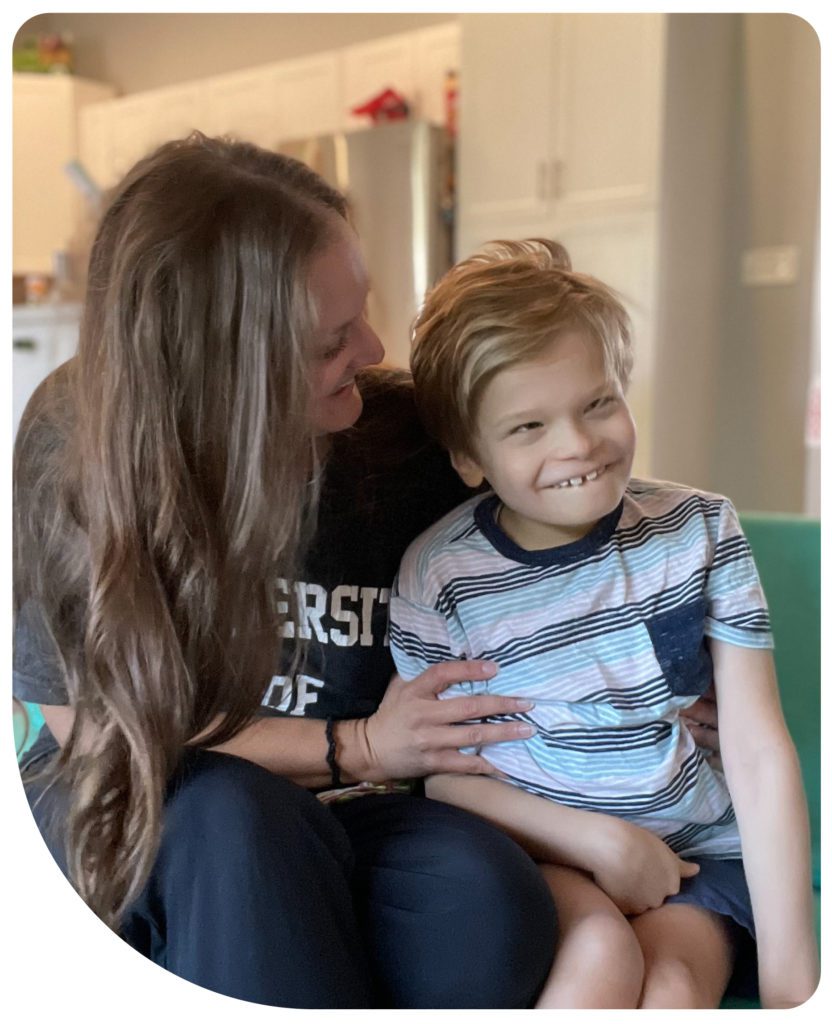November 30, 2021
Listen Now or on Your Favorite Podcast Platform
The Problem
There are 65.7 million people providing care to someone without being paid in the United States. The majority of those caregivers are family members of the person receiving care. People should be able to receive care from the ones who know them best—and those caregivers should be paid for the work they do.
Join Michael and Holly as they talk with Melissa Schlemmer, primary care provider for her child, Christopher. Melissa discusses what being the caregiver for someone with a disability means. And she talks about the many people who provide care for a loved one but are unable to be paid for it.
What We Can Do About It
It’s easy to get paralyzed by the feeling that we can’t make a difference. But helping out can be a lot simpler than we think.
Step 1: Check Your Biases
We can’t fully understand a person’s situation unless we’ve lived it. For many people, family providing care to family is the best option. And in many cases, it can be a cheaper option as well. In addition, caregiving is hard work. Caregivers deserve to be paid a living wage for the work they do.
Step 2: Learn About Family Caregiving Laws in Your State
The laws and restrictions around who can provide care for someone varies by state. In some states, it does not matter if you’re related to the person needing care. In other states, you can provide care to family, but only if you don’t live with the person. But in a few states, being family to the person needing care means you can’t get paid if you provide care. And some states even restrict which funding programs allow a choice in caregivers at all.
Caregiver.org has a list of various social services and organizations by state. Find out what the laws in your state are. If family caregivers are excluded, contact your members of Congress and advocate for change.
Step 3: Support AARP
AARP is an organization that empowers retired people to choose how they live as they age. They have been a national leader in their support of family caregivers being paid for their work.
Boom. You’ve made a difference.

Melissa’s Story
Melissa Schlemmer was a caregiver for a family before she had children of her own. When her son, Christopher, was born with a rare disease called PMM2-CDG, she made the decision to stay home as Christopher’s primary caregiver. In addition to being a dedicated wife, mother, and caregiver, Melissa also writes. She has had pieces published with The Mighty, Today’s Parents, and Huffington Post. She also runs her own blog called The Special Mom.
Get More Information on Family Caregivers
Current Advocacy and Studies
- Congress.gov – The Recognize, Assist, Include, Support, and Engage (RAISE) Family Caregivers Act was signed into law in 2018. With it, a Family Caregiving Advisory Council was created.
- Administration for Community Living – The initial report from the RAISE Family Caregiving Advisory Council was given to Congress in September 2021. It includes 26 recommendations for how the government can better support family caregivers.
- AARP and the National Alliance for Caregivers – A 2020 report showed that 51% of caregivers feel their role has given them a sense of purpose or meaning. But, 23% said that caregiving has made their own health worse.
- Congress.gov – Information on the Build Back Better Act (H.R.5376) currently proposed in Congress. This bill includes provisions that could help family caregivers.
Why We Should Care About Family Caregivers
- Aging and Mental Health Journal – 60% of spousal caregivers reported having no choice in taking on the caregiving role.
- American Psychological Association – Caregivers who live with their participant have a higher risk of adverse outcomes.
- The Retirement Project – Older adults are more likely to be unmarried or divorced than in the past. This means they may not have as many family members they can rely on for care.
Caregiver Burnout Resources
- Cleveland Clinic – Information about caregiver burnout including tips on how to prevent it.
- American Medical Association – Caring for caregivers: a guide for physicians.
- Mayo Clinic – Tips about taking care of yourself when dealing with caregiver stress.
- AARP – How to identify and manage caregiver stress. This article is also available in Spanish.
- Aging Care – This article goes over the difference between caregiver burnout and compassion fatigue.
